Halloween can be a scary time. Many Christians wonder whether the holiday has pagan origins and whether its dark imagery can become too dark. Regardless of what view Christians take about Halloween, the fact remains that Halloween’s themes raise worthwhile spiritual questions. Is there truly a supernatural realm? If the supernatural realm includes evil, can it be defeated?
Various Christian scholars (and even pastors) have argued that horror fiction can raise important religious questions. Sometimes, horror fiction even provides clever religious conclusions, reminding readers about evil’s dangers and goodness’ victory over darkness. From the gothic period onward, practicing Christians have written dark stories that consider religious ideas—including some famous writers, like C.S. Lewis.
Most Christian publishers don’t advertise novels about demons, angels, or killers as horror novels. More and more fans have been willing to talk about Frank Peretti’s books as horror novels, and some would even argue Left Behind is a kind of horror story. However, if you’re looking for scary Christian Fiction, it’s usually listed as supernatural fiction or religious suspense. For fairness, the following list considers a few current writers whose books may easily be categorized as horror fiction. Other writers in this list wrote their books before Christian Fiction became a publishing label, and their works often get much closer to horror territory. Each writer was a practicing Christian whose books have provoked discussions about how a scary tale can discuss Christian ideas.
Photo Credit:©Getty Images/JDawnInk
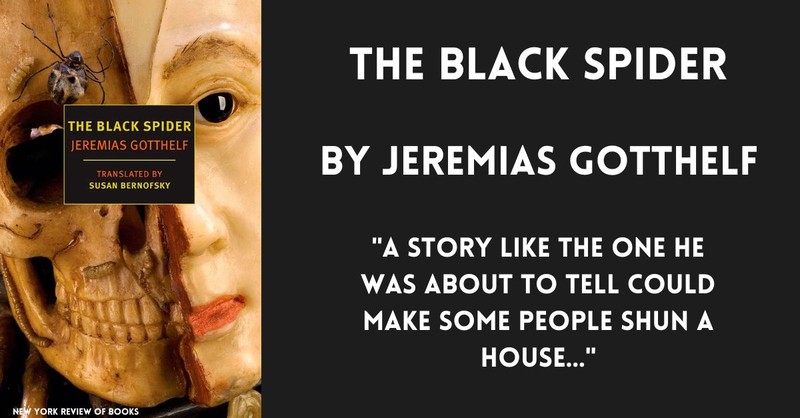
1. The Black Spider by Jeremiah Gotthelf
Scholar Jonathan Greenway observes that gothic fiction was infused with Biblical imagery and theological ideas, although not always reaching orthodox conclusions. The Black Spider, written by pastor Albert Bitzius under a pen name, takes a more orthodox view of faith than some other gothic tales.
The story opens with a christening in a Swiss village, with guests dropping by the family house afterward. One guest asks about a window frame that doesn’t fit the rest of the home, with its blackened wood frame. The grandfather tries to redirect the conversation, but eventually, the full story comes out. Generations ago, a tyrannical lord demanded the villagers transplant a small forest to his castle, leaving not enough time to finish the task. A stranger appeared in the town, offering to help… in exchange for an unbaptized child. As the plot continues, it becomes clear this stranger is more than a mortal man.
By today’s standards, The Black Spider is short, and the moral takeaway is a bit heavy-handed. However, like a classic fairytale, there are compelling moments and a clear moral, and it’s a moral worth remembering: evil often makes its demands seem reasonable at first.
Photo Credit: New York Review of Books
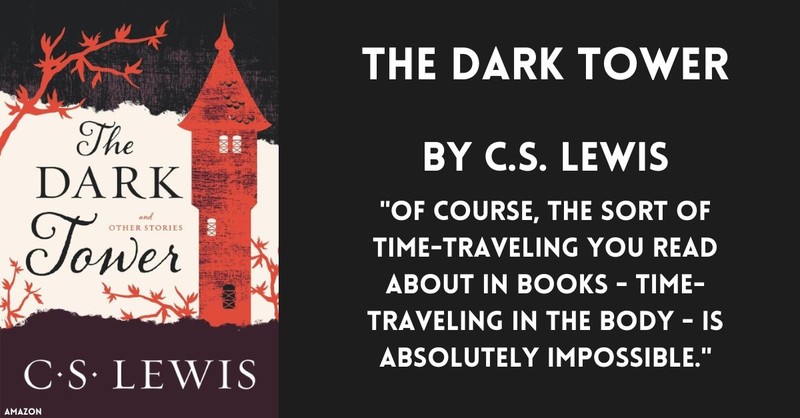
2. The Dark Tower by CS Lewis
SPECIAL OFFER: Enroll in this free online course on C.S. Lewis today!
The Dark Tower is one of the more surprising sections in Lewis’ bibliography. He began the book as the conclusion to his Space Trilogy, a series of stories about the adventures of professor Elwin Ransom. Previously, Ransom had traveled to Mars (in Out of the Silent Planet) and Venus (in Perelandra). The Dark Tower starts with Ransom back at his university, discussing time travel with some colleagues. One of the colleagues, Orfieu, demonstrates a time telescope he has invented which shows events at a fixed location either far in the future or far in the past. When everyone looks through the device, they see something horrible. In a strange land, a man with a horn in his head commands a team of slaves to work in a tower, creating new slaves why injecting his horn into their bodies. The landscape is hard to understand… until one of the men notices that the tower where events occur looks like one of the university buildings.
Even unfinished, The Dark Tower shows Lewis using scary imagery cleverly. Like his better-known science fiction novels, it raises interesting questions about what happens when secular scientists come up against something beyond their understanding, and the supernatural can’t be dismissed.
Photo Credit: Amazon
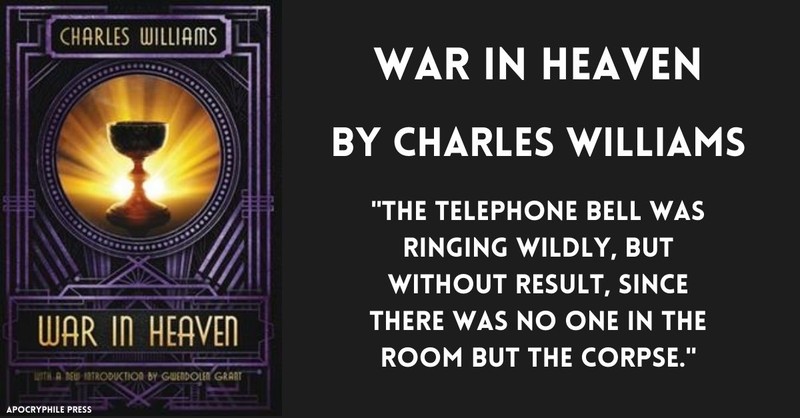
3. War in Heaven by Charles Williams
Charles Williams was one of Lewis’ good friends and a later member of the Inklings. He wrote many things, from plays to Dante scholarship. Of Williams’ diverse works, his supernatural thrillers are probably the best to start with. Each of these seven books starts with a suitably scary premise: someone is after a sacred object they plan to use for sinful ends. Someone who doesn’t know much about supernatural matters will find they have to work with others to stop the sacred object from being misused. By the end, the righteous will have realized that understanding their spiritual ties to each other, as pieces of God’s creation, provides the real answer to withstanding evil.
War in Heaven is Williams’ first published thriller and the best introduction to his unique style. It begins with a body being discovered in a publishing house. Publisher Gregory Persimmons doesn’t seem too disturbed, but he has something more important on his mind: the holy grail. Archdeacon Julian Davenant has the holy grail on his mind, too… after he skims a to-be-published history book that claims his church has it. Davenant returns to his church in time to find the grail, but then a thief knocks him out. Meanwhile, Gregory Persimmons experiments with diabolical ceremonies, preparing to use the grail’s power for unholy means.
Photo credit: Apocryphile Press
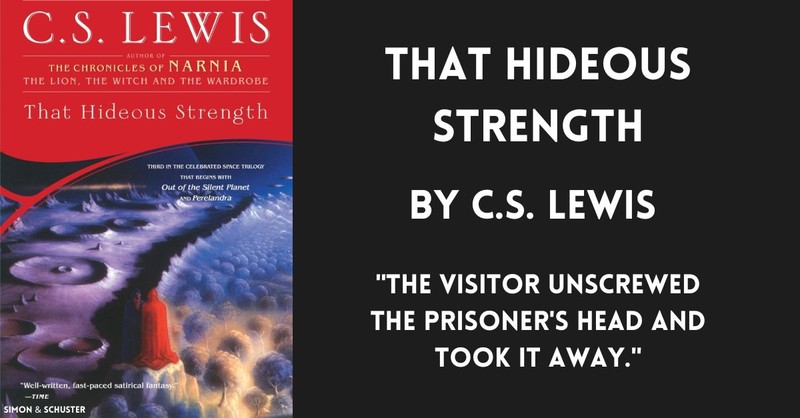
4. That Hideous Strength by C.S. Lewis
The fully realized end of Lewis’ Space Trilogy is very different from his unfinished The Dark Tower. Different scholars have described That Hideous Strength as a science-fiction novel, a horror story, a supernatural thriller, and everything in between. Whichever way you read it, it’s unsettling yet fascinating as it explores the conflict between twisted science and religion, trust and skepticism.
The story begins with Jane Studdock seeing her husband Mark leave for work at the local college. Mark has been offered a job with a research group called NICE, which could be a lifetime opportunity. Jane doesn’t tell her husband that she’s been having strange nightmares about a disembodied head and a man awakening from hibernation. After seeking advice from friends, Jane ends up in a community organized by Dr. Elwin Ransom. Ransom explains that Jane’s dreams are visions of things that may happen, of events that he and his friends are working to prevent. Meanwhile, Mark discovers that NICE is more than a research institute. In fact, NICE is working with sinister masters to change England in unimaginable ways.
Photo Credit: Simon & Schuster
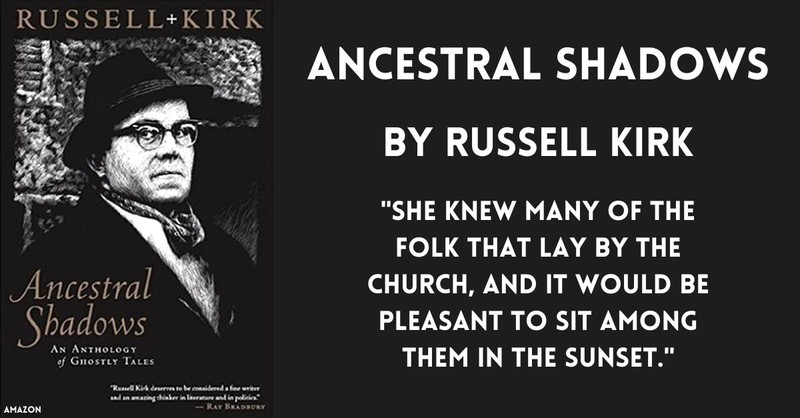
5. Ancestral Shadows by Russell Kirk
Russell Kirk is best known today as a political writer who wrote books like The Conservative Age and contributed to important publications like National Review. Kirk also wrote fiction, mostly stories involving ghosts and other strange paranormal events. While these stories don’t usually have the fantasy elements of the Inklings, Kirk mentioned both Charles Williams and C.S. Lewis when talking about his work. In one essay, Kirk argues that Lewis wrote stories with ghostly and supernatural material but with “a moral and theological end.” For Kirk, the point of telling a story about ghosts or demons was always to make a moral point—usually that there was a genuine supernatural realm and that evil will be defeated.
Kirk explored theological ideas in different ways in different stories. His novels (Old House of Fear, A Creature of the Twilight, Lord of the Hollow Dark) mixed spy thriller and gothic tropes, so the fight between good and evil feels adventurous. In his short stories, most collected in Ancestral Shadows, the sadness and irony of sin’s consequence stand out more clearly. In his introduction to the anthology, Vigen Gurion argues a Christian worldview appears strongest in Kirk’s later stories, but Kirk never tries to give a documentary view of the afterlife. His stories play with interesting ideas about what judgment and redemption might look like on the other side, showing readers why their souls and beliefs matter.
Photo Credit: Amazon
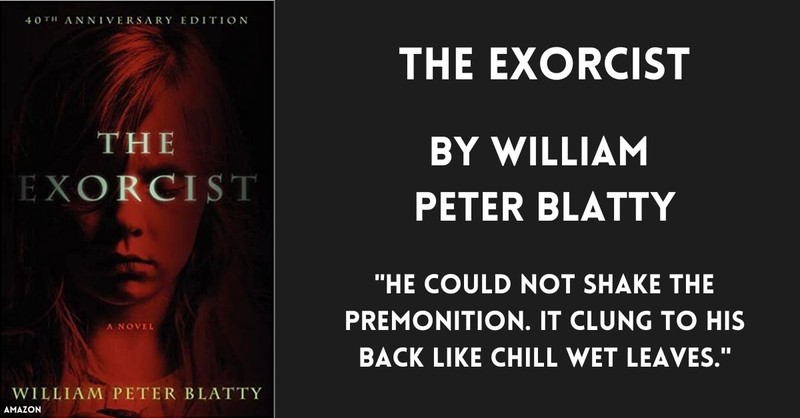
6. The Exorcist by William Peter Blatty
Much has been said about this book’s grueling images, captured in all their brutality in the 1973 film. What sometimes gets missed in that discussion is William Peter Blatty was a practicing Roman Catholic who said he wasn’t interested in telling a scary story. As Blatty put it in a 2015 Fox News column, he believed telling a story about demon possession pushes readers to realize the devil may truly exist… and according to the Bible, that means accepting God exists. Hence, a story about demons becomes a way to have a conversation about the spiritual realm and God’s existence.
Readers who feel squeamish about The Exorcist’s dark content may prefer Blatty’s sequel Legion. This book features no exorcisms but some interesting discussions about God’s existence. Lieutenant Kinderman, the detective who tracked a murder case in the first book, is now looking into copycat serial killer crimes. His investigation leads him to a psychiatric patient at a local hospital. The problem? How the patient got out of the hospital to commit crimes…. And why he looks suspiciously like one of the deceased priests from the exorcism case.
Photo Credit: Amazon
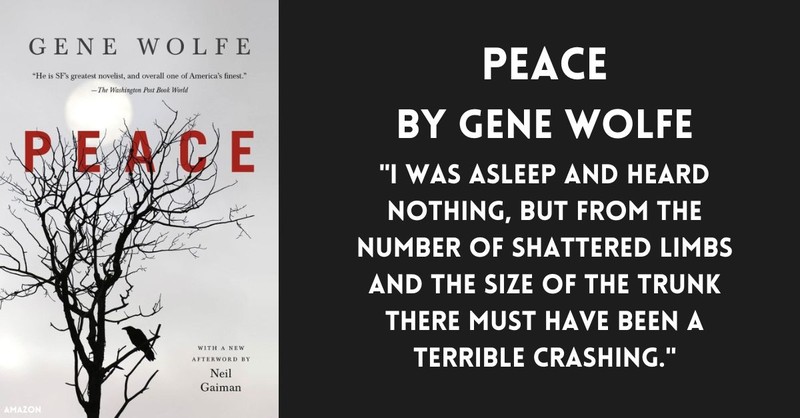
7. Peace by Gene Wolfe
Gene Wolfe was not only one of his generation’s most acclaimed science fiction writers. He may have been one of his generation’s most underrated religious writers. Wolfe took his faith seriously without turning his books into sermons. When one interviewer asked about his faith, Wolfe answered, “I’m a writer who is Catholic,” meaning he didn’t go out of his way to fit religious messages in his books. Wolfe’s influences include writers like G.K. Chesterton and J.R.R. Tolkien, men who cleverly worked their faith into their stories. Peace, a ghost story that doesn’t sound like a ghost story, sums up Wolfe’s clever and subtle approach.
The novel follows Alden Dennis Weer, a bachelor reflecting on his upbringing in a small Midwestern town. His childhood occurred in a Mayberry-like time during the early 20th century, and Weer meanders as he talks about the people he grew up with. However, when Weer mentions several deaths, it becomes clear Peace is more than just nostalgic literary fiction. Weer isn’t as trustworthy as he seems and has some dark secrets he won’t share easily. By the end, Peace has become a haunting meditation on life’s value and carrying one’s sins.
Photo Credit: Amazon
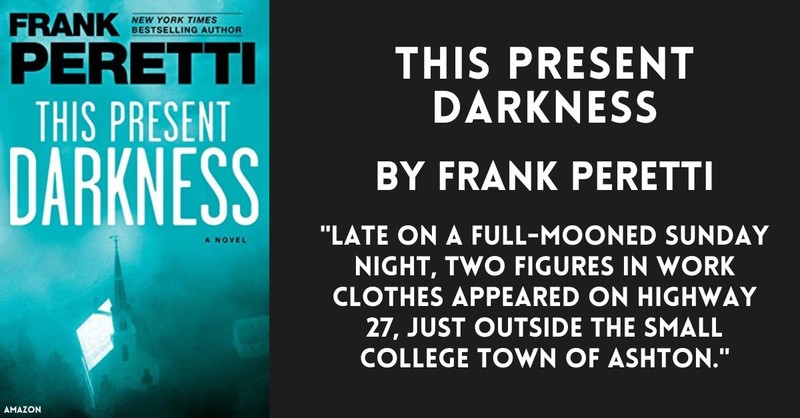
8. This Present Darkness by Frank Peretti
Since it came out in 1986, This Present Darkness has become one of the foundational texts in Christian Fiction. Like many supernatural thrillers, it tells a story about a dark spiritual battle but is also a story about the period when it was written. Daniel Silliman analyzes it as a 1980s horror novel in the style of Stephen King, where something supernatural invades a town and slowly makes its presence known.
In the small town of Ashton, pastor Hank Busche and journalist Marshall Hogan know something is not right. Busche struggles to keep his church alive and wonders if some of his parishioners are correct when they say something demonic is behind recent threats. Hogan finds clues of a New Age group taking over Ashton’s college, which may have ramifications for the whole town. As their searches for truth intersect, others help them find the spiritual insights and tools they need to fight the real battle.
Photo Credit: Amazon
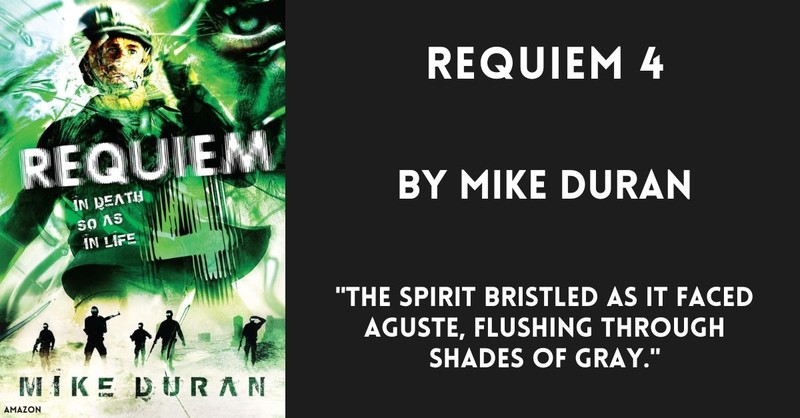
9. Requiem 4 by Mike Duran
Pastor-turned-storyteller Mike Duran has spoken and written many times about how his faith fits with writing supernatural tales of strange events. Requiem 4 leans more into science fiction than some of his other work, halfway between a story about ghosts and a Blade Runner-style story about a grim future. The combination allows Duran to break some interesting new territory.
Father Aguste Lax isn’t sure how he feels about his job. He’s a chaplain for the Requiems, a unit of military specialists devoted to removing ghosts from graveyards. UniGlobe, the corporation that controls what’s left of human civilization, doesn’t get into the religious implications of the ghosts that the Requiems clean up. Many dismiss the ghosts as some leftover subatomic energy. Lax grapples with what his faith means, unsure whether he’s laying souls to rest. When his unit comes up against a super-powered ghost, Lax realizes what he believes could lead to life or death.
As with Russell Kirk and Gene Wolfe’s work, whether Christians can believe ghosts exist isn’t the point. Duran uses his plot to consider how good humans are at rationalizing away the supernatural, yet how that attitude eventually creates deeper problems. He also provides an engaging portrait of the classic problem of full-time Christian ministry workers navigating hard times when they wonder what they truly believe in.
Photo Credit: Amazon
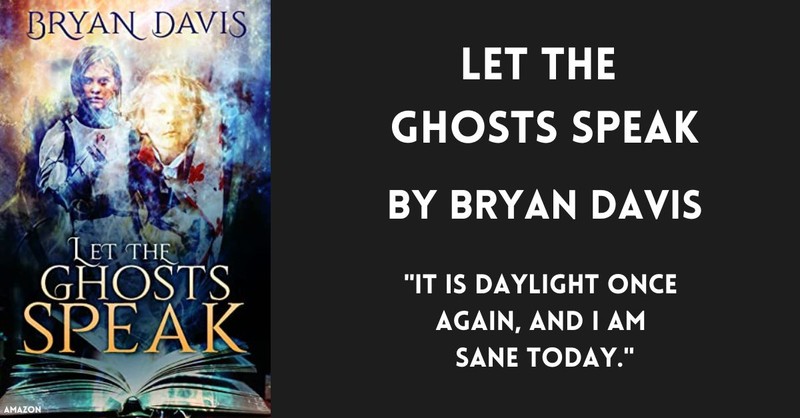
10. Let the Ghosts Speak by Bryan Davis
To many fans, Bryan Davis is best-known for fantasy novels like Raising Dragons or his recent End Times sci-fi series Oculus Gate. Let the Ghosts Speak is different, a clever ghost story with murder mystery elements set in 19th-century France. Justin Trotter is an English immigrant who becomes a murder suspect at a masquerade party and is visited by ghosts who help him unravel the murder to its shocking conclusion.
Like Russell Kirk’s fiction, this novel doesn’t take an “as seen in the Bible” approach to describing the supernatural. It plays with the idea of ghosts, considering the theological ideas their existence might bring up. Ultimately, his ghosts are like the main characters in C.S. Lewis’ novel The Great Divorce: deceased people who haven’t overcome their flaws, stuck in limbo until they grow into the freedom they were designed for. The story’s setting and period give it a fun gothic atmosphere, like an homage to Edgar Allan Poe.
Photo Credit: Amazon

Great Books and Articles about Christian Horror
Sometimes the best way to deal with a question is to look at what others have written about the question. If you’re wondering how Christianity’s emphasis on grace and redemption fit with horror’s emphasis on darkness, you may find these resources helpful. Some of them are books where scholars consider the intricate spiritual implications of horror stories. Others talk about particular storytellers or stories that combine religion and horror in interesting ways. All of them are worth exploring.
1. Theology and Horror edited by Brandon Grafius and John W. Morehead
2. Good Versus Evil in the Films of Christopher Lee by Paul Leggett
3. A Christian Response to Horror Cinema by Peter Fraser
4. The Undead and Theology edited by Kim Paffenroth and John W. Morehead
5. Christian Horror By Mike Duran
6. Be Afraid by Joseph Haward
7. Terence Fisher by Paul Leggett
8. If There Were Demons, Then Perhaps There Were Angels by William Peter Blatty
9. The World Turned Upside-Down by Michael S. Heiser
10. Faith, Film, and Philosophy edited by R. Douglas Geivett and James S. Spiegel
You may also find these articles helpful:
1. “A Christian Perspective on Horror in Movies and Culture” by Grant Horner
2. “Are Horror Movies the Perfect Genre for Christians?” by Eric Metaxas
3. “Interview: Filmmaker Scott Derrickson on Horror, Faith, Chesterton and Deliver Us From Evil” by Steven D. Greydanus
4. “An Apologetic of Horror” by Brian Godawa
5. “Horror: The Perfect Christian Genre” by Peter T. Chattaway
6. “3 Things Horror Movies Can Teach You about Your Faith” by Liz Kanoy
7. “A Cautionary Note on the Ghostly Tale” by Russell Kirk
8. “Cosmic Horror vs. Holy Terror” by Jason Morehead
9. “In Memoriam Arthur Machen” by Geoffrey Reiter
10. “Bram Stoker and C.S. Lewis” by Mervyn Nicholson
You can also find some great perspectives on fantasy, horror, and the religious debates it generates in Mythlore’s Inklings and Horror seminar and the website TheoFantastique.
Photo Credit: Getty Images/Chinnapong






